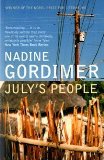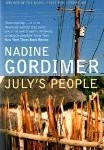
Nadine Gordimer won the Nobel Prize for Literature in 1991
July’s People was our latest book group choice. Unfortunately I was unable to make the discussion, which is a shame as I think this is a book which benefits from being discussed.
July’s People is set in South Africa. The book follows the Smales, a white couple and their three children, as they are rescued from the violence taking place in their city. Their servant, July, takes the family back to his native village where they have to learn to cope in a world very different to the one they have left. The small rural community uses little money, finding everything they need in the forest. The Smales have to adjust to the reversal of power, relying on the black community to both protect and provide for them. The book gives a fascinating insight into the difference between the black and white communities of South Africa and the delicate relationship between the two.
Unfortunately July’s People wasn’t an easy read. The prose was confusing and this meant that I often has to re-read entire sections in order to work out what was happening. There were no speech marks so it was difficult to tell who was speaking – sometimes the speaker even switched mid-line. This meant that I found myself concentrating on the words rather than what was happening. The effort it took to understand each page meant that any emotion that might have been present was removed. I felt very detached from all the characters and because I often didn’t know who was talking they lacked a unique voice, all seeming to merge into one. I found myself having to invent their feelings based on the situation, but this felt fake as I don’t really know how things must have been for them.
The premise for this book is fantastic, but the complexity of the prose ruined it for me.
Recommended to anyone who enjoys studying books rather than reading them.
The other members of the book group seemed to enjoy this book much more than me and they also found out more about the background of this book. I recommend you read their insightful reviews:
Kim’s Review, Simon’s review, Claire’s review, Polly’s Review
Have you read anything by Nadine Gordimer?
Are all her books difficult to understand?

24 replies on “July’s People – Nadine Gordimer”
I didn’t realise that you struggled with reading it quite as much as you did. It took me a few pages to orientate myself to the style and I admit that it was thoroughly off-putting to begin with but once I did adjust I found the voices distinct. It is a book that benefits from discussion (I imagine) and reflection; I have even more admiration for the text now that I clearly see the exceptionally clever things that Gordimer did with the master/servant power relations.
I think that in a synopsis of this novel it benefits to highlight that it was written during apartheid and that it was an imagined end to it; the political significance of the novel and its controversy at the time is immense. Racial segregation of any kind but especially apartheid interests me as a subject matter. I will definitely be reading more Gordimer as her treatment of race relations excites me; I’ve already picked up a few more of her books, all of which appeal to me in different ways (and sound rather autobiographical).
Claire, I do appreiciate that this is an important book, with lots of interesting themes. I didn’t know any of the backdrop to the novel until I read your review and I do think that helps to build a greater appreciation of the author’s agenda. I will be reading some of her other books, as they are on the Booker list, but I can’t say I’m looking forward to them.
Thank you for your review on this book. I also want to say thanks for
linking other reviews on this book. It helps a reader to get diffferent perspectives on one book. Many thanks.
Mystica, I should link to other reviews more often. Thank you for pointing out how useful that can be.
Maybe I’m lazy, but I don’t like to have to work too hard at enjoying a book. The prose in Blindness was a little tough to get used to like that, but I didn’t mind it so much after a few chapters. I think I’ll skip this one!
Sandy, I’m happy to admit that I’m a lazy reader. I don’t enjoy studying books – I want to be drawn into a story, not fight to find out what is happening.
Blindness had a different writing style, but it wasn’t difficult to understand. This one is in a different complexity league and I don’t blame you for wanting to skip it!
Oooh, this sounds really interesting! Recently I’ve become a lot more interested in reading African literature, so this sounds like something I would really enjoy… or at least like to try! As you know, I thought Disgrace was fantastic, and I’ve been looking for other books that explore black/white relations in South Africa. Thanks for bringing this book to my attention!
Steph, I loved Disgrace and have a passion for African literature, but this just wasn’t my thing. I look forward to finding out what you make of it and hope you enjoy it more than I did.
I don´t think I have read any of her novels, but I have taught some of her excellent short stories. I wonder whether it is difficult to follow because the narrator is supposed to be an uneducated person? In one of her short stories the narrator is a little girl in the first part and a teenager in the ending. I was very impressed by her ability to change the style and vocabulary over a few pages.
Dorte, I don’t think that having an uneducated narrator was the problem. The narrator changed frequently and they all seemed difficult to follow. She is clearly a talented writer, but is just not for me.
Ick, I hate studying a book instead of enjoying the flow of the story line and emotion. I think that irritates me more than anything, although I have read books where I had to concentrate more than usual and it ended up being a great read. Too much concentration (studying), though, and pfff!, forget it…
Lynne, I don’t mind concentrating on a book – the complicated ones are often the best! Unfortuantely this one took the concentration a step too far!
I know…there’s definitely a fine line, huh.
This sounds like a really, really interesting read. I’m sorry it was so confusing! How awful. 🙁
She, It is really interesting – don’t let my laziness put you off if you like the sound of it.
I’m not surprised that you didn’t enjoy Gordimer’s style of writing — I found it challenging in The Conservationist. I still plan on picking up July’s People this year since the premise sounds really interesting, but I hope the book is one I end up reading rather than studying!
Mome Rath, The Conservationist is next on my Gordimer list (due to Booker) Sorry to hear that it sounds as though the writing style is similar in the two books. I had hoped it might be easier!
Thank you for the review (and warning!).
I might feel differently if I had more time to read, but as things are now, I’m lucky to carve out an hour a day. I simply don’t have the time to invest in something confusing, overly dense, or otherwise difficult. I’m afraid I’ll never get to half the books I don’t want to miss, so it’s easy to skip the difficult set.
(I do wonder what the author is intending? Is she trying to achieve a certain effect and the clarity is sacrificed, inadvertently? Is she trying to slough off casual and middle-brow readers? Is this just the way her mind works and she assumes it’s perfectly clear?)
artemisia, Great point! I would love to know why the author does that sort of thing. I’m sure they have good reasons for it, but I prefer simpler books. I think Disgrace is a very powerful book because of it’s simplicity. This book lost that impact for me.
Like Claire I didnt realise just how much you had struggled with it. Shame you werent at the group the more we spoke about it the more we all loved it. It’s interesting to say you dont like studying books as isnt that what a book group and blog kind of do, we study analyse and share our thoughts?
Simon, I don’t think that I study books on my blog. I remember studying books in school – I hated trying to decide why the author had put individual words into each paragraph or inventing symbolism that I’m sure the author had no intention of including.
If you have to read a page more than once then I think it starts to feel more like studying than reading. This book did get easier as it progressed, but it always felt like an effort, a chore that I didn’t really want to finish. I do appreciate its quality in retrospect, even more so since I’ve read your reviews, but I’m not sure it was worth the effort.
The book group does study books a little bit, but we tend to discuss general themes rather than specific words/sentences. I just give my opinions on my blog (unlike some lit blogs, which are heading in the study direction) Interesting question though.
I am not sure if this book is for me, but thanks anyway for your honest review!
Andreea, I’m pleased you found it useful!
I admit I didn’t love this either, and the prose was a struggle. I would recommend it as a book group book as you get alot of discussion out of it and I definitely improved my opinion after talking about it. It didn’t make me want to run out and get any more Gordimer books though…!